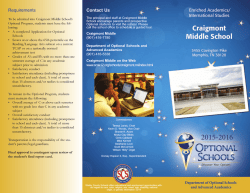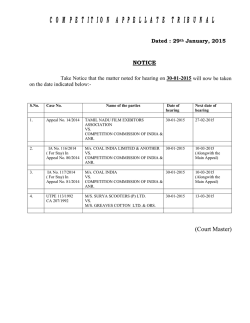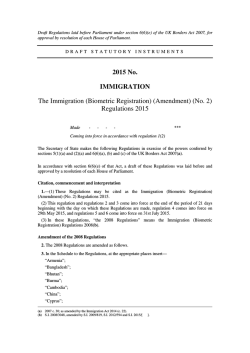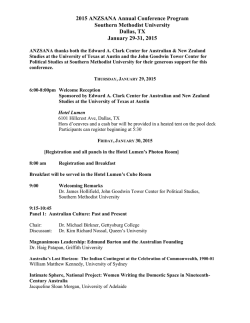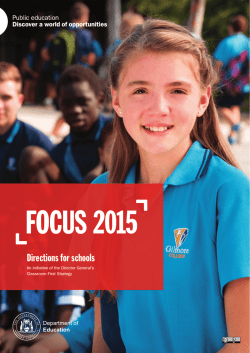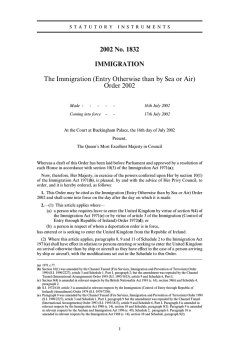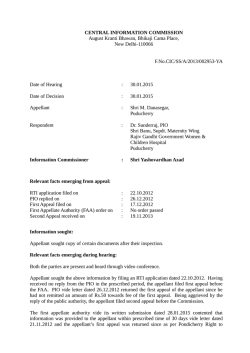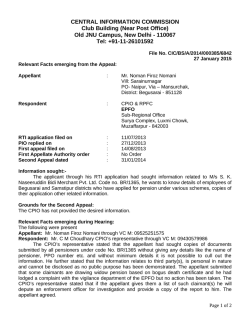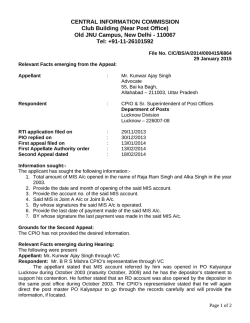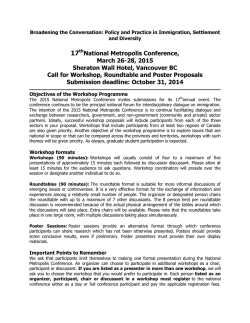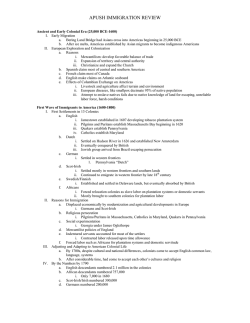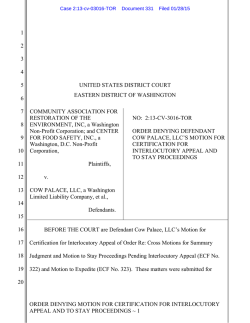
How the regulator approved policy is implemented at Swinburne
Course Progress for International Vocational Education (VE) students: How the regulator approved policy is implemented at Swinburne Swinburne has adopted the regulator approved ESOS Course Progress Policy and Procedures for CRICOS Providers of VET Courses. The following table sets out the requirements of the DoE-DIBP Policy and how these are addressed at Swinburne. How the Requirement is Implemented at Swinburne DoE-DIBP Policy Requirement Who is Responsible When is it Implemented Provider must assess progress at the end of every compulsory study period (maximum length of a study period is six months) Swinburne assesses progress in the middle and at the end of every year. Progress Team End of each progress review period Unsatisfactory progress is defined at not successfully completing or demonstrating competency in at least 50% of the course requirements in a study period. If students do not pass 50% or more in a progress review period, Swinburne’s academic progress process is activated. Progress Team End of each progress review period Provider must have an intervention strategy for students who are not making satisfactory progress which is available to staff and specifies: The University’s Academic Courses Regulations provide for the following intervention strategies: Progress Team End of each progress review period Progress Team End of each progress review period Progress Team End of each progress review period Procedures for contacting and counselling students Strategies to assist students Process by which the intervention strategy is activated The intervention strategy must include provision for advice on: Suitability of course Opportunities for re-assessment Fact that unsatisfactory progress in two consecutive progress review periods can lead to reporting to Australian immigration authorities Intervention strategy to be activated within first four weeks of following study period, however providers are encouraged to activate their intervention strategies earlier. Written warning for international students who fail 50% or more in a progress review period Request to show cause for international students who fail 50% or more in two consecutive progress review periods Students are advised of support tools and services they can access as part of this process. The intervention strategies provide opportunities for students to seek advice on course suitability and opportunities for re-assessment. The written warnings and show cause requests advise students that unsatisfactory progress can lead to reporting to Australian immigration authorities. The University often activates its intervention strategy earlier than the first four weeks of the following progress review period. If a student is identified as not making satisfactory course progress in a second consecutive progress review period the provider must notify of its intention to report to Australian immigration authorities. The University manages this process in stages: Progress Team End of each progress review period The written notice must inform the student that they are able to access the provider’s complaints and appeals process within 20 working days. Stage 2 Progress Team End of each progress review period Students can apply for review on all these grounds and others. Review officers are instructed to pay special attention to these grounds. Review Officers Following a decision to exclude for unsatisfactory progress It is open to review officers to make these and other decisions. If a review is allowed, the student is not reported. Review Officers Within 21 working days of a student submitting an application for review Students who are excluded for unsatisfactory progress are reported via PRISMS after the review and appeal timeframes have passed. ESOS Compliance staff When the decision to exclude is final and all review and appeal timeframes have passed Stage 1 Students who do not make satisfactory course progress in a second consecutive progress review period are sent a request to show cause that notifies them that if they are excluded for unsatisfactory progress they will be reported to Australian immigration authorities. If a student is excluded, they are advised in writing that they can apply for a review of the decision within 21 working days under the University’s Review and Appeals Regulations. The University’s allowance of 21 working days is more generous than the base level compliance requirement. A student may appeal on the grounds that: Their results were not recorded correctly Compassionate or compelling circumstances Provider has not properly implemented its intervention strategy or other policies Successful appeal outcomes can vary. For example: If there was an error in calculating results such that the student actually made satisfactory course progress, the student should not be reported and there is no requirement for intervention. If the student has compassionate or compelling circumstances, support should be offered and the student not reported. Where a student does not access the appeals process within time, withdraws from the process, or the student’s appeal is unsuccessful, the provider must report the student via PRISMS as not achieving satisfactory progress.
© Copyright 2026
